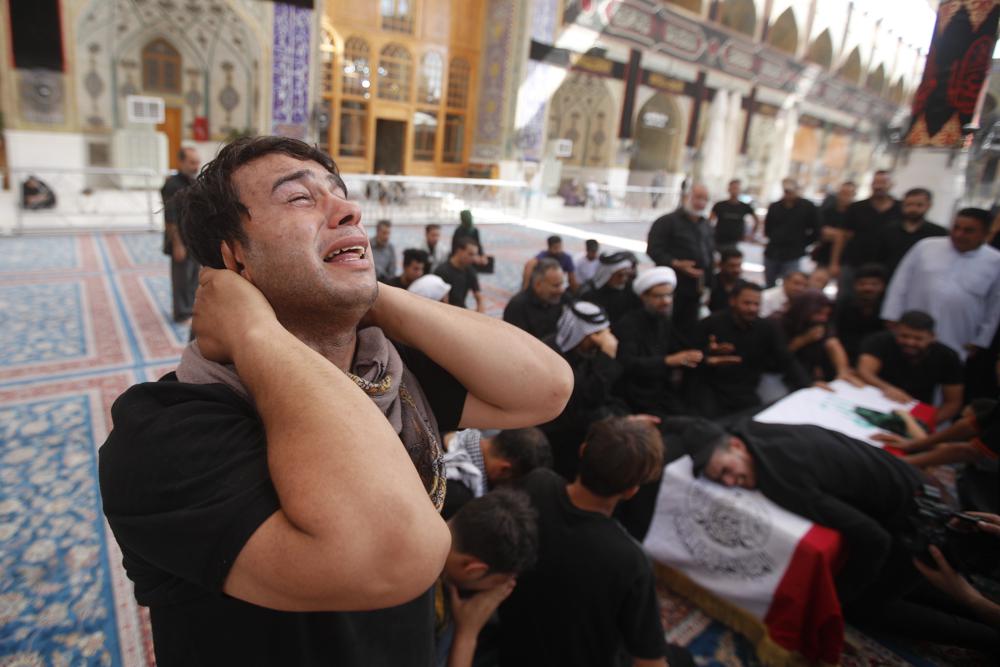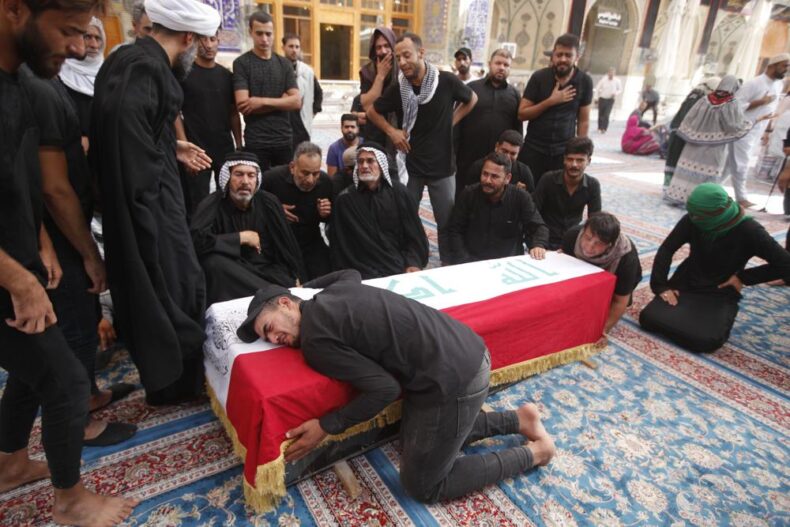By Harsha Josephine Antony | On Tue 30 Aug 2022 | 10.15 pm IST |
Photo credit: AP Photo

Armed followers of an influential Iraqi cleric who had been fighting with security forces in the capital’s streets on Tuesday began to leave the streets as the political crisis in the nation significantly worsened. A painting of al-Sadr waving was leaning up against a tree as his supporters packed up rugs, tea cups, and the leftovers of their four-week sit-in.
After a major escalation of the country’s political crisis, armed supporters of a powerful Iraqi cleric who engaged in street combat with security personnel in the capital started to leave the streets on Tuesday. Following two days of fatal rioting that raised concerns that instability would spread throughout the nation and even the region, cleric Muqtada al-Sadr, 48, ordered his supporters to vacate the area outside the government building where they had gathered. In a short period, people were spotted heeding the call, taking down their tents, and leaving the “Green Zone.” The adherents of the cleric gathered their possessions and loaded their mattresses onto trucks for transport. Roadways and the stairs leading up to the Iraqi parliament were covered in rubbish. As al-supporters Sadr’s bundled up carpets, tea cups, and the remains of their four-week sit-in, a painting of him waving was propped up against a tree.
Iraqi military
The removal of a statewide curfew, also declared by the Iraqi military, gave optimism that the situation was abating even while the more significant political crisis was still unresolved. Questions have been raised about how matters like the dissolution of parliament and the calling of early elections will be handled between opposing groupings in light of Al-attempt Sadr’s to defuse tensions. Outside the government zone, protesters in favour of al-adversaries Sadr’s disbanded their gathering. Since al-party Sadr’s received the most extensive number of seats in the October legislative elections but not enough to win a majority government, Iraq’s government has remained impassed. Between al-Shiite Sadr’s supporters and his Iran-backed Shiite enemies, this resulted in months of political infighting until it became violent on Monday.
Al-announcement Sadr’s to leave politics set off the ensuing mayhem. The Green Zone, formerly the U.S. military’s bastion and now the location of the Iraqi government offices and international embassies, was stormed by his followers after many saw the action as a ruse to increase his leverage. After breaking through the government palace’s walls, they barraged into its opulent salons and marbled halls. On live television on Tuesday, his supporters could be seen pelting the tightly guarded Green Zone with machine guns and rocket-propelled grenades as security personnel intermittently returned fire, and armoured vehicles waited in the background. While most onlookers fled behind walls and winced when shots rang out close, several recorded the gunfight on their mobile devices.
At least 30 people were slain before al-Sadr advised his supporters to return home in response to appeals for restraint from several Iraqi leaders and the United Nations. The cleric declared in a televised address that “this is not a revolution.” Al-Sadr apologised to the Iraqi people and stated he could not support the bloodshed after inspiring his supporters to assault the parliament in July with demands for revolution and reform. His continued authority over his followers and, consequently, his sway over the Iraqi political class were highlighted by the sudden shift in the streets.
According to two Iraqi medical sources, approximately 400 people were also injured in addition to the scores of fatalities. Because they were not authorised to provide the material to journalists, the officials talked on the condition of anonymity. Although even before al-directive, Sadr’s streets outside the capital’s government sector mainly stayed calm. Iran blocked its borders to Iraq earlier Tuesday as an indication that it worried the turmoil would expand. Despite a slight decline in global benchmark Brent crude prices, the nation’s essential oil supply continued to flow. According to Iranian state television, Iran resumed flights to Iraq later on Tuesday.
Saddam Hussein oppressed members of Iraq’s majority Shiite Muslim community for a long period. The Sunni Saddam Hussein-led invasion in 2003 that overthrew him tipped the political system on its head. Iraq is made up of little under two-thirds Shiites and one-third Sunnis. Shiites are currently engaged in internal conflict, with those supported by Iran and others who identify as Iraqi nationalists vying for control over the state’s authority and resources. It’s a fierce rivalry in a nation where many people are apprehensive of the influence of the Iranian regime, even yet commerce and interpersonal links are still robust. A million people died in the deadly 1980s conflict between Iran and Iraq. Most Al- Sadr’s supporters are from Iraq’s poorest socioeconomic groups and have historically been excluded from the political system under Saddam. Therefore, their nationalist rhetoric and reform agendas strongly resonate with them.
Al- Sadr’s declaration that he would resign from politics gave his supporters the right to behave wherever they pleased. His address on Tuesday successfully restrained them. Before it, the turmoil prompted warnings to be issued to nationals by neighbouring nations, and one embassy was closed. Iran not only shut its borders but also warned its residents not to visit the neighbouring nation due to the unrest. When the decision was made, millions were getting ready to travel to Iraq for a yearly pilgrimage to Shiite shrines. Iraq and Kuwait have a border that is 254 kilometres (158 miles) long, and Kuwait has urged its nationals to leave Iraq. Those who wanted to visit Iraq were advised to postpone their plans by the state-run KUNA news agency.
The Green Zone and other areas where demonstrations are taking place are to be avoided, as well as a Do Not Travel recommendation, according to a security alert from the U.S. Embassy in Baghdad. Early on Tuesday, Wopke Hoekstra, the Dutch minister of foreign affairs, tweeted that the Netherlands had evacuated its embassy in the Green Zone. Around the Baghdad embassy, there are firefights. Our employees are currently employed by the German embassy in another part of the city, Hoekstra stated. Emirates, a long-distance airline, based in Dubai, ceased operations in Baghdad on Tuesday. The airline claimed to be “closely monitoring the situation.” When the flights would resume was not specified.













